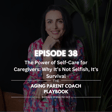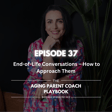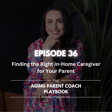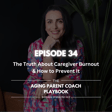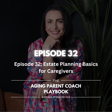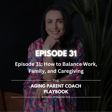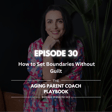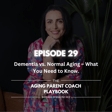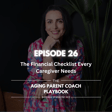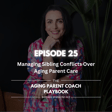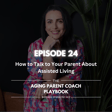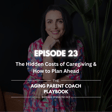Become a Creator today!Start creating today - Share your story with the world!
Start for free
00:00:00
00:00:01

Episode 28: Creating a Care Plan That Works for Your Family
Are you caregiving in crisis mode? You're not alone—and you don't have to keep doing it that way. In this episode of The Aging Parent Playbook, Dr. Barbara Sparacino—psychiatrist, aging parent coach, and fellow sandwich generation member—walks you through how to create a care plan that actually works for your family.
You’ll learn:
- ✅ The 4 essential parts of a truly comprehensive care plan
- ✅ How to get your family on the same page (without constant conflict)
- ✅ How to adapt your plan as your parent’s needs evolve
Whether you’re deep in the caregiving journey or just starting to notice changes in your parent’s abilities, this episode is packed with practical steps you can implement right now.
🎁 Don’t miss the FREE Care Plan Guide at www.theagingparentcoach.com to help you take action today.
It’s not about perfection—it’s about preparation.
Transcript
Introduction to Care Plans
00:00:00
Speaker
Hi everyone, and welcome back to the Aging Parent Playbook. I'm your host, Dr. Barbara Sparacino, psychiatrist, aging parent coach, and fellow member of the sandwich generation. Today, we're diving into a topic that can truly change their caregiving game.
Challenges Without a Plan
00:00:17
Speaker
Creating a care plan that actually works for your family. Let's be honest, most families are just trying to keep their heads above water when it comes to caregiving. They're reacting to problems in real time.
00:00:29
Speaker
There's usually no roadmap, no designated roles and no long-term strategy. Does that sound familiar? But here's the thing, crisis mode caregiving is exhausting and not sustainable.
Benefits of a Care Plan
00:00:43
Speaker
Having a care plan in place changes everything. It reduces stress, it cuts down on arguments, it helps your parent get better care and it helps you show up in a way that aligns with your values, not just your calendar.
00:00:57
Speaker
So in today's episode, we're going to cover the four essential parts of a comprehensive plan, how to get your family on the same page, and how to adjust your plan as your parents' needs evolve over time.
00:01:14
Speaker
Whether
Components of a Care Plan
00:01:15
Speaker
you're already deep in the caregiving trenches or just starting to notice your parents slowing down, this episode is packed with practical tips you can start using today.
00:01:27
Speaker
Let's get into it.
00:01:33
Speaker
So what are the four essential parts of a care plan? Let's start with the basics. A real care plan, the kind that helps you sleep at night, covers more than just medication reminders or who's picking up mom from physical therapy.
00:01:50
Speaker
Here
Managing Medical Needs
00:01:51
Speaker
are the four essential components you need to include. First, we have medical care. This one seems obvious, you know, but it's often incomplete.
00:02:04
Speaker
Ask yourself, who's managing your parents' doctor's appointments? Is someone keeping a running list of medications, side effects and interactions? Do you have access to the patient portal?
00:02:17
Speaker
Are you part of the care team? If your parent is seeing multiple specialists or if you have siblings in other states, is it easy for information to get scattered? That's why I recommend designating one medical point person.
Daily Living Support
00:02:33
Speaker
It doesn't have to be the person doing the physical caregiving, but someone should be responsible for tracking appointments, test results, and clinician communication.
00:02:45
Speaker
If possible, use a shared document or an app like CaringBridge or CareZone or even a simple shared Google Doc to keep the whole family in the loop. The second part is daily living support.
00:03:00
Speaker
So also known as activities of daily living or ADLs, things like bathing, dressing, eating, toileting, mobility. This is the part of caregiving that can sneak up on you.
00:03:13
Speaker
One week your dad's fine getting in and out of the shower and the next week he slips and falls. So this part of the plan needs to include what help is needed now, who is providing,
00:03:26
Speaker
the help. What's the backup plan if that person can't step in?
00:03:34
Speaker
You may decide to rotate responsibilities among family members or you might choose to hire in-home help. Either way,
Financial and Legal Planning
00:03:41
Speaker
be realistic about capacity, not just intention.
00:03:47
Speaker
Number three is financial and legal planning. This is a section most families avoid until they can't avoid it anymore. I've seen so many adult children caught off guard because their parents didn't have a will or didn't grant power of attorney or had assets that no one knew how to access.
00:04:07
Speaker
This part of the plan should answer, are finances organized and accessible? Has someone been granted durable power of attorney?
00:04:21
Speaker
Are medical directives, wills and trusts completed? Don't worry, if this isn't all figured out yet, that's okay.
Emotional and Social Wellbeing
00:04:29
Speaker
What matters is that it becomes a priority. You don't want to be sorting through these details in an emergency room, trust me.
00:04:36
Speaker
And the fourth one is emotional and social wellbeing. This is the most overlooked section of a care plan and often the most important. Your parent isn't just a list of tasks and medical issues.
00:04:51
Speaker
They're a human being who still wants joy, meaning and connection.
00:04:57
Speaker
So ask, are they socially engaged?
00:05:03
Speaker
Are they participating in activities that bring them purpose? Are they emotionally supported? Maybe it's weekly visits with grandkids. Maybe it's a book club or a church group or gardening.
00:05:17
Speaker
Whatever it is, don't skip this part. Mental
Family Dynamics and Communication
00:05:20
Speaker
health is just as crucial as physical health and aging well.
00:05:33
Speaker
Now let's talk about the elephant in the room, family dynamics. If you've ever tried to plan care with multiple siblings, in-laws or extended family, you know it's rarely simple.
00:05:44
Speaker
Everyone has different opinions, different levels of availability, different interpretations of what's best. That's why your care plan should include a family communication strategy.
00:06:00
Speaker
Here's how i recommend approaching it. Hold a family meeting, whether it's in person or virtual, gather the key players and clearly define roles. Who's handling finances?
00:06:12
Speaker
Who's checking in on medications? Who's coordinating care? This isn't about making everything fair. It's about making things functional.
00:06:23
Speaker
Not everyone can do the same amount but everyone can do something. Even if a sibling lives far away, maybe they can be in charge of coordinating appointments or handling insurance claims.
00:06:36
Speaker
Second, put the plan in writing. You'd be amazed how much conflict disappears when things are written down. Who's doing what, when it's happening, and what the backup plan is if something changes.
00:06:51
Speaker
A written care plan isn't just a document, it's a shared agreement. It creates accountability and reduces miscommunication. Three,
Flexibility and Adaptation
00:07:03
Speaker
stay flexible.
00:07:04
Speaker
Look, people change, needs change, schedules change, and your care plan will need to change too. The key is keeping communication open, nonjudgmental, and focused on solutions.
00:07:17
Speaker
Sometimes you'll need to renegotiate roles. Sometimes you'll need to bring in outside help. That's not failure, it's adapting. Which brings us to our final segment, adapting the plan as needs change.
00:07:33
Speaker
One of the biggest myths about care plans is that you create one and you're done. But the truth is care plans are living documents. Your parents' health may improve or decline.
00:07:48
Speaker
Their mobility may change. Their emotional needs may shift. Family built availability may vary. And that's why I recommend a care plan check-in every three to six months.
00:08:00
Speaker
Set a reminder, block 30 minutes.
00:08:04
Speaker
Ask yourself, what's working? What's not working? Are there new concerns? Does anyone need more support? This
Conclusion and Resources
00:08:13
Speaker
check-in isn't just for logistics.
00:08:15
Speaker
It's also for emotions. Sometimes resentment builds. Sometimes burnout creeps in. Talking about this early prevents a lot of heartache alo later.
00:08:27
Speaker
If you're overwhelmed, ask for help. Caregiving isn't meant to be a solo sport.
00:08:35
Speaker
Let me leave you with this. Caregiving is smoother when you have a plan. Even if you don't have it all figured out yet, even if the conversations feel awkward, it's better to start somewhere than to stay stuck in chaos.
00:08:51
Speaker
And to make it easier, I've created a program to help you.
00:09:00
Speaker
If you log onto my website, theagingparentcoach.com, you can find it under the Aging Parent Care Course.
00:09:12
Speaker
It's not about perfection, it's about preparation. And that's what the Aging Parent Playbook is all about. Thanks for joining me today. And if you found this helpful, I'd be so grateful if you leave a review or share this episode with someone you love.
00:09:28
Speaker
Take care and I'll see you in the next one.




